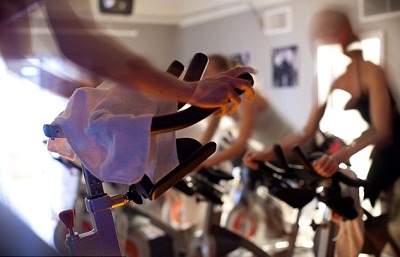Just a few minutes of exercising as hard as you can may be just as good for you as a longer work out – at least at the cellular level, a small new study suggests.
If your usual excuse for skipping workouts is that you just don’t have time, you’d better find a new one – or better yet, hit the gym.
Researchers at Victoria University in Australia found that two minutes of ‘sprinting’ on a bicycle was just as good for their study participants as a slower 30 minute ride according to Daily Mail .
The first rule of exercise is to do it.
Two minutes, however, isn’t much to ask and it just might be enough to keep your body going strong for longer.
Most of us look at the mirror or the scale to get a sense of how effective our workout routines are.
Scientists, on the other hand, look at our cells.
Among the most important cellular benefits of exercise is its effects on mitochondria, the organelles that churn out energy for out cells.
As we age, mitochondria slow down, gradually producing less and less energy, so we start to slow down, too.
But exercise reinvigorates mitochondria, and the new research suggests that may happen even faster than we thought.
What’s more, physical activity also seems to signal mitochondria to replicate themselves more, creating more energy sources for the cell.
A 2017 study suggested that exercise’s effects on the mitochondria as well as certain proteins might finally explain why working out is so good for us.
According to the new Victoria University study, it may not take much to reap the benefits.
Researchers there monitored eight young adult volunteers as they tried out each of three different work out plans.
For one, they rode continuously for 30 minutes, but never at more than half of their maximum effort.
Following the model of trendy HIIT workouts (high-intensity interval), the riders also did five four-minute cycling sessions, pedaling at 75 percent their maximum capacity. Each bout was separated by a one-minute rest and recovery time.
The final group did four ‘sprints,’ cycling as fast as they could, but only for 30 seconds at a time, with four-and-a-half minutes of rest time between.
When the researchers analyzed mitochondria in the riders’ thigh muscles they saw that the 30-second sprinters’ cells were just as well primed to duplicate as the cells from the moderate-intensity riders.
‘This suggests that exercise may be prescribed according to individual preferences while still generating similar signals known to confer beneficial metabolic adaptions,’ the study authors wrote.
‘These findings have important implications for improving our understanding of how exercise can be used to enhance metabolic health in the general population,’ even the laziest of us.
N.H.Kh

